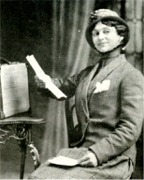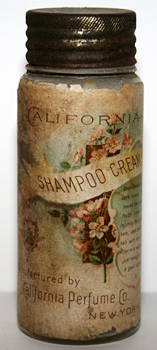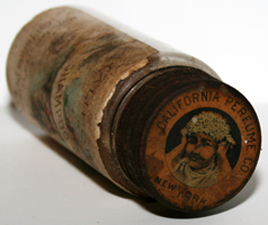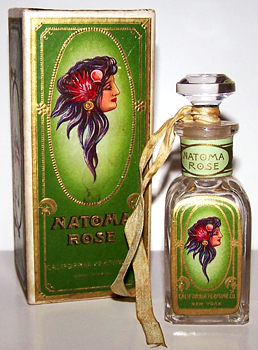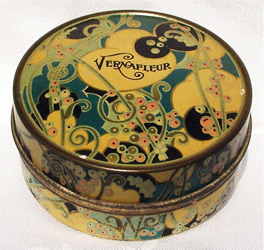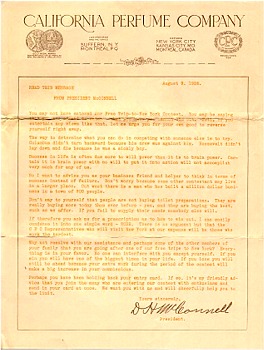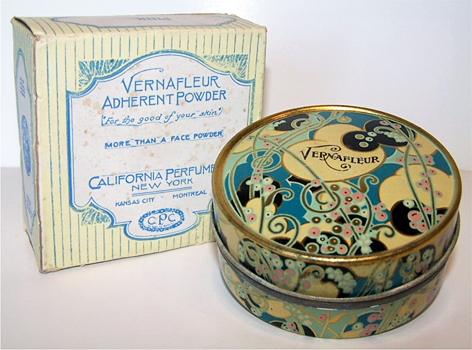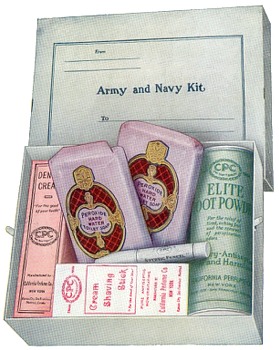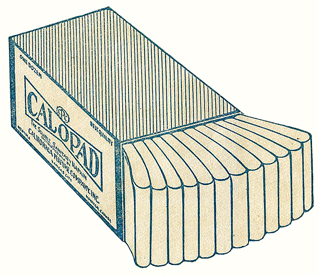What's HOT and What's NOT!
Main Navigation | Collector's Corner
This section is a real sticky-wicket to write! I believe this is critical information necessary for a novice CPC collector. And I believe that it could be just as beneficial to the seasoned collector. Regardless of one's real or perceived experience, having more information with which to make an informed decision when purchasing, or even seeking, a particular California Perfume Company treasure IS the name of the game! Herein I have attempted to outline some basic HOT/NOT principles to help folks underpin those "informed decisions".
The HOT/NOT Listings
The HOT category are simply those CPC items that are rare or in-high-demand. There is a difference between the two: rare means that there are very few pieces still in existence and therefore necessarily command a higher purchase price; in-high-demand means that regardless of the actually number of items still in existence, the demand for those items exceeds their availability. An example of a rare item is the below pictured 1898 California Shampoo Cream bottle—this is the ONLY known example of a shampoo cream bottle with this container and this labeling style. An example of an in-high-demand item would be the below pictured one ounce 1915-1922 Natoma Rose Perfume bottle. Though there are many known examples of this bottle in varying degrees of condition (poor to mint), the fact is that MANY collectors within AND outside the California Perfume Company arena seek to purchase this item (as well as any other Natoma and Natoma Rose products.) The Indian Maiden on the label draws the attention of a vast array of collectors...and consequently sky-rockets the prices of Natoma pieces.
|
|
|
The NOT category includes items that are either very plentiful/common—the opposite of rare—or that collectors consistently demonstrate little interest in acquiring. A crystal clear example of a common CPC item is the 1925-1931 Vernafleur Ardent Face Powder tin represented in the picture below. The reason that these tins are so plentiful 80+ years after their marketing is that these tins themselves make very good "what-not" containers—for pins, coins, buttons, and the list goes on and on. Sold immediately preceding and during the Depression era, people became quite frugal and employed these fairly nice looking tins as sturdy containers for other, secondary items after the face powder was consumed. It only made wise sense! An example of a CPC item generating little interest from the average collector is a Letter to the Representatives on California Perfume Company letterhead (also shown immediately below.) Admittedly, many such letters are in existence, especially from the 1920's onward. Also, the latter-years correspondences from the Main Office rarely possessed an original autograph from D. H. McConnell, Sr. Lastly, paperwork items, though awesome for historical content, are VERY hard to display and more so as a paper collection grows.
|
|
|
Following are basic listings of HOT and NOT items. These are not ALL-inclusive lists. They simply highlight some real winners and some real losers (in my opinion—I had to say that!) within CPC collecting. Also—big point here—items not found on either of these lists means that the items are good, solid collectibles; however, the items should be purchased, or sought for, as collectibles and not considered for their potential resale value some time in the future (clear as mud?)
|
|
HOT |
NOT |
|
|---|---|---|---|
|
|
All CPC items manufactured before 1909 |
1910-1922 Atomizer Perfume Bottle (triangular shape) |
|
|
HOT/NOT Table Footnotes: + There are many Mission Garden compacts, especially the double compacts, that have survived to date. They may not be considered common, however, they are certainly not rare as are most of the other Mission Garden products. ++ Tubes containing creams such as Witch Hazel Cream, Almond Cream Balm, and Concentrated No-Alcohol Flavoring often deteriorated over the years. * The orange Jack & Jill Jungle Jinks tin container (depicting Jack and Jill going up the hill on one side and tumbling down the hill on the other) is a very common CPC item. Much like the 1925-1931 Vernafleur Ardent Face Powder tin, this tin made a very good "what not" container after the original contents were consumed. Most tins observed today are in poor to fair condition. ADDITIONALLY, the Jack & Jill Jungle Jinks set with all of it's original contents in very good to excellent condition would be a "HOT" item. ** The four ounce version of the 1915 to 1929 Trailing Arbutus Talcum tin is extremely common and there are many very good to near-mint examples available. This assessment DOES NOT APPLY to the 1914 version of the four ounce Trailing Arbutus Talcum tin or the 1915 to 1925 four ounce version with the brass shoulder/neck and fancy sifter lid. |
Condition IS EVERYTHING!
Focusing primarily on the NOT category, it is reasonable to assume that if a common item is discovered in near-mint to mint condition, especially when accompanied by its original box, then THAT item would be a strong collectible! See the Vernafleur Ardent Face Powder tin pictured below. This tin is near-mint and (though not seen) possesses all of its original contents within an unbroken seal. And, this somewhat UN-common find includes its original box—albeit with some marring and staining. This is an excellent addition to any collection because of the relative rarity of a NEAR-MINT, FULL, BOXED Vernafleur Ardent Face Powder tin.
|
|
Conversely, a rare item like the California Shampoo Cream bottle pictured at the top of this page may not be in mint condition nor will it come with its original paper/cardboard container. However, if sold, the rare item will normally fetch a significant price simply because of it's rarity—and in the shampoo case, it's the only one known to exist. Therefore, rarity often dictates the "just-take-what-you-can-get" philosophy, especially when those infrequent opportunities arise...knowing that higher-than-mint prices will be paid for a less-than-mint CPC items.
For more about the importance of condition, please see the Collector's Tips section.
If you have any questions or comments, please contact Rusty at george (at) californiaperfumecompany.com.
Special Bonus Material: What's SUPER HOT!!!
I wanted to add this BONUS section to discuss those California Perfume Company treasures that have never yet been seen, and for that matter, may never be seen. One of the most important aspects of CPC collectibles is that they were consumables: items that were meant to be purchased and used (usually over a very short time period), discarded, then replaced with new consumable goods. Thus, many of the products sold over the California Perfume Company's 53 year run (before changing over to Avon Products, Inc.) are lost to antiquity and known only because of an entry in one of the early catalogs or on a line item on a representative's order sheet. These are the real treasures! If ANY of these products were discovered, they would undoubtedly command the highest prices at sale!
|
|
|
The above two examples—the 1918 Army & Navy Kit, sent to men during World War I, and the 1926-1928 Calopad Sanitary Napkins—represent two excellent illustrations of CPC items that have not yet been, and probably never will be, found. Admittedly, having an illustration of an item is extremely valuable. But also consider...the first CPC catalog was not produced until a decade after the company's start. The first catalog, produced in 1896, contained no illustrations. The 1897-1901 catalogs contained sparse hand-drawn illustrations of some items. The 1902 and onward catalogs contained pictures, but not of all the available items. And larger volume items—the quart, half-gallon, gallon, five pound, etc. sizes—were very rarely depicted. All that is to say, there are 'tons" of products that were produced/manufactured by the company over a half century that we really don't know what they looked like!
| SUPER HOT ITEMS! |
|
1886-1892 Any item sold/given away by McConnell (prior
to the California Perfume Company name) |
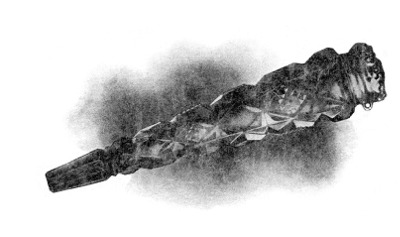
Holiday Gift Box No. 3 Vinaigrette
~1903
A Personal Note:
Here is one last personal note for those adventuresome folks that have continued to read this far (good on you!) I watch e-Bay obsessively and from time to time I scan certain Antiques web sites that I know handle CPC items. It never ceases to amaze me when I see never-before-photographed/never-before-documented CPC treasures come up for auction or for sale. Those extremely rare items will often sell for a pittance while, at the very same time, I may see a heated bidding battle for what I know to be something quite common—by common I mean that if you wait a little while, another of the very same item WILL come up for auction again. The advice I am woefully trying to convey is this: REALLY know your hobby. Determine what is common and what is not (that's why I put this section together—to help you with just that task). And seek to build a distinctive collection, not one that contains all the blah, hum-drum pieces that every one else possesses too.
Happy hunting and all the best!
Rusty

